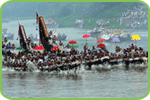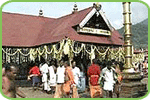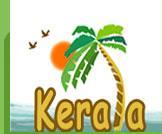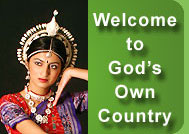|
|
|
Cuisine of Kerala |
|
|
The
cuisine of Kerala is as distinctive as its cultural life
and religious tradition. The cuisine of Kerala is very
rich and the culinary skills of the various communities
in Kerala have given very large varieties to it. While
Hindus specialize in delicious vegetarian food, the
Muslims and Christians excel in non vegetarian cuisine
like Pathiri, Kozhi curry, Biryani, fish dishes like Meen Pollichathu and Fish Molee. The cuisine of Kerala
is influenced by the long coastline and flavoured by the
all-pervasive coconut. The cuisine is enriched with
exotic tropical fruits, vegetables, cereals, seafood ad
herbs. It is garnished with the distinctive aroma of
spices like pepper, cardamom, chillies and
|
 |
|
|
cloves that brought explorers like Marco Polo and Vasco da
Gama from across the seas. It is a holistic, natural
nutritious cuisine that follows the tenets of Ayurveda. |
|
|
|
Coconut
and spices are added to every dish in Kerala. No meal in
the State is complete without rice. Bananas are also
very popular in Kerala cuisine. A typical Kerala
breakfast may comprises of Puttu, the rice powder and
grated coconut steam cooked together, idli, sambar and
dosa with chutney, idiappam (string hoppers) or appam, a
king of pancake made of rice edged with a crisp lacy
frill, eaten with chicken or vegetable stew. Toddy,
which is tapped from coconut trees is a favorite drink
among the rural men, local people and tourists. Kanji
and Payaru, Kappa and Fish curry are traditional
favorites. 'Kappa' (Tapioca) and fish curry served with
toddy make a unique combination. The crunchy |
 |
|
|
pappadam,
achappam, Pazham Pori, Kozhalappam, Churuttu, Cheeda, Murukku,
Upperi, Avalos unda, banana and jack fruit chips can be eaten
at any time. With innumerable lagoons, lakes and canals,
estuaries and a network of over 44 rivers, Kerala's backwaters
offer a wealth of freshwater fishes amongst which the Black
Pearl Spot is famous for its irresistible taste. The vast
stretches of seashore ensures that Kerala is blessed with
succulent lobsters, prawns, crabs, mussels and a whole range
of delicacies. Malabar, the spice coast of Kerala has a unique
cuisine where the Arabic influence is unmistakable. The
lightly flavoured, aromatic biriyani, rich meat curries and
sweet desserts are a treat for the taste buds. Tender coconut
water, the world’s safest natural soft drink, is a refreshing
and nutritious drink. |
|
|
The sadya,
an integral part of the Kerala's culture is a feast that
is served on a plantain leaf and eaten with the hand.
With an amazing variety of up to 400 vegetarian dishes,
the Sadya is served mostly during marriages and
festivals. The preparation of the dishes and the order
in which they are served is important in a Sadya. Sadya
is the sumptuous spread of rice and more than 14
vegetable dishes of Sambar, Rasam, Olan, Kaalan, Pachadi,
Kichadi, Aviyal, Thoran, Pickle, Crisp pappadam and
banana chips topped with Payasam, the deliciously sweet |
 |
|
|
dessert cooked
in milk. Usually, the Sadya is rounded off with different
varieties of payasams, which are sweet desserts. The Syrian
Christian and the Malabar community have their own variants of
the Sadya which include non-vegetarian dishes too.
In Kerala, the utensil in which the food is cooked is important
in determining the taste and nutrition of the dish.
Terracotta, bamboo, brass, bronze, copper or even leaves are
used in cooking various traditional dishes. Many of the
traditional vessels like Chembu, Uruli, Varpu, Bharani and
Chatti are aesthetically attractive too. |
|
|
|
 |
 |
|
Kerala Boat Races |
Kerala Pilgrimage |
|



